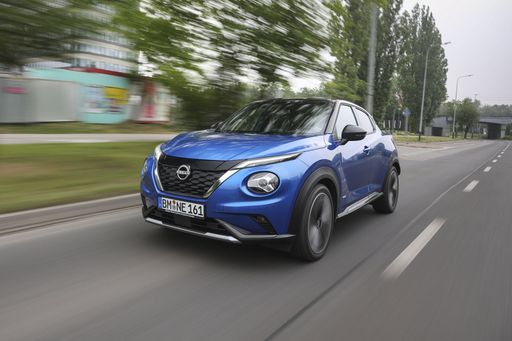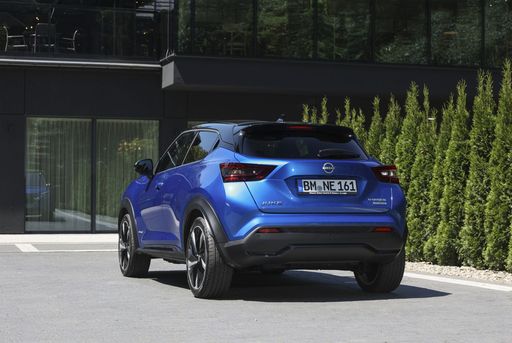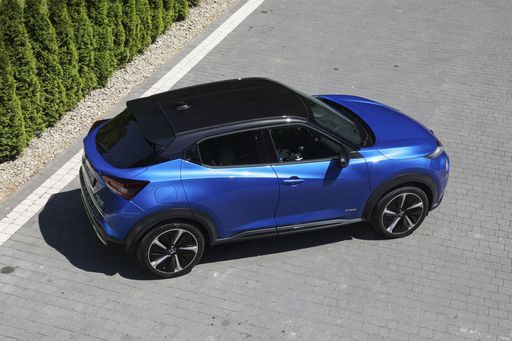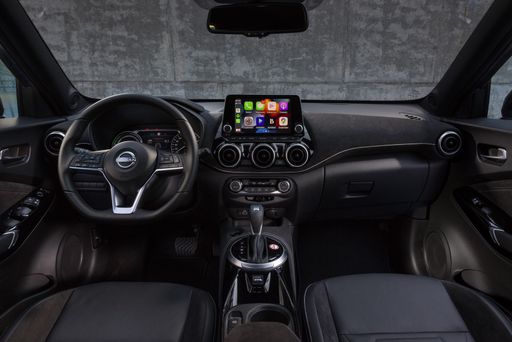Nissan Juke vs Porsche Cayman – Differences & prices compared
Compare performance, boot space, consumption and price in one view.
Find out now: which car is the better choice for you – Nissan Juke or Porsche Cayman?
The Nissan Juke (SUV) comes with a Petrol or Full Hybrid engine and Manuel or Automatic transmission. In comparison, the Porsche Cayman (Coupe) features a Petrol engine with Automatic transmission.
When it comes to boot capacity, the Nissan Juke offers 422 L, while the Porsche Cayman provides 184 L – depending on how much space you need. If you’re looking for more power, decide whether the 143 HP of the Nissan Juke or the 500 HP of the Porsche Cayman suits your needs better.
In terms of consumption, the values are 4.70 L per 100 km for the Nissan Juke, and 13 L for the Porsche Cayman.
Price-wise, the Nissan Juke starts at 21400 £, while the Porsche Cayman is available from 136000 £. Compare all the details and find out which model fits your lifestyle best!
Nissan Juke
The Nissan Juke stands out with its distinctive design and bold styling, making it a popular choice for those seeking something different on the road. Its interior cleverly combines modern technology with comfort, offering an enjoyable driving experience for both the driver and passengers. Despite its compact size, the Juke provides a surprising amount of space and versatility, making it suitable for urban adventures and weekend getaways alike.
details @ germany.nissannews.com
@ germany.nissannews.com
 @ germany.nissannews.com
@ germany.nissannews.com
 @ germany.nissannews.com
@ germany.nissannews.com
 @ germany.nissannews.com
@ germany.nissannews.com
Porsche Cayman
The Porsche Cayman stands out as a quintessential sports car, blending sleek design with dynamic handling. Its mid-engine layout provides an excellent balance and sharp agility that driving enthusiasts crave. Inside, the Cayman offers a refined and driver-focused interior, ensuring that every journey is an exhilarating experience.
details

|
|
|
|
|
Costs and Consumption |
|
|---|---|
|
Price
21400 - 30100 £
|
Price
136000 £
|
|
Consumption L/100km
4.7 - 6 L
|
Consumption L/100km
13 L
|
|
Consumption kWh/100km
-
|
Consumption kWh/100km
-
|
|
Electric Range
-
|
Electric Range
-
|
|
Battery Capacity
0.60 kWh
|
Battery Capacity
-
|
|
co2
107 - 136 g/km
|
co2
295 g/km
|
|
Fuel tank capacity
46 L
|
Fuel tank capacity
54 L
|
Dimensions and Body |
|
|---|---|
|
Body Type
SUV
|
Body Type
Coupe
|
|
Seats
5
|
Seats
2
|
|
Doors
5
|
Doors
2
|
|
Curb weight
1274 - 1405 kg
|
Curb weight
1490 kg
|
|
Trunk capacity
354 - 422 L
|
Trunk capacity
184 L
|
|
Length
4210 mm
|
Length
4456 mm
|
|
Width
1800 mm
|
Width
1822 mm
|
|
Height
1593 mm
|
Height
1267 mm
|
|
Payload
405 - 427 kg
|
Payload
281 kg
|
Engine and Performance |
|
|---|---|
|
Engine Type
Petrol, Full Hybrid
|
Engine Type
Petrol
|
|
Transmission
Manuel, Automatic
|
Transmission
Automatic
|
|
Transmission Detail
Manual Gearbox, Dual-Clutch Automatic, Automatic Gearbox
|
Transmission Detail
Dual-Clutch Automatic
|
|
Drive Type
Front-Wheel Drive
|
Drive Type
Rear-Wheel Drive
|
|
Power HP
114 - 143 HP
|
Power HP
500 HP
|
|
Acceleration 0-100km/h
10.1 - 11.8 s
|
Acceleration 0-100km/h
3.40 s
|
|
Max Speed
166 - 180 km/h
|
Max Speed
315 km/h
|
|
Torque
200 Nm
|
Torque
450 Nm
|
|
Number of Cylinders
3 - 4
|
Number of Cylinders
6
|
|
Power kW
84 - 105 kW
|
Power kW
368 kW
|
|
Engine capacity
999 - 1598 cm3
|
Engine capacity
3996 cm3
|
General |
|
|---|---|
|
Model Year
2024
|
Model Year
2021
|
|
CO2 Efficiency Class
D, E, C
|
CO2 Efficiency Class
G
|
|
Brand
Nissan
|
Brand
Porsche
|
Nissan Juke
Introduction to the Nissan Juke: A Compact SUV with Style
The Nissan Juke has always been a standout in the compact SUV segment, renowned for its bold design and impressive versatility. As we look at the 2024 model year, Nissan continues to innovate, offering a range of options that cater to both practicality and driving pleasure.
Performance and Efficiency: Under the Bonnet of the Nissan Juke
The 2024 Nissan Juke comes with a variety of engine choices tailored to suit different driving needs. With power outputs ranging from 114 to 143 PS, these engines strike a balance between performance and efficiency. The petrol options are equipped with a 1.0-litre three-cylinder engine that generates 114 PS, providing a sprightly drive perfect for urban environments. Meanwhile, the 1.6-litre hybrid version offers 143 PS, combining electric and petrol power for a more eco-friendly performance.
Fuel consumption varies between 4.7 and 6 L/100km, highlighting the Juke's commitment to efficiency. With CO2 emissions ranging from 107 to 137 g/km, the Nissan Juke offers an environmentally conscious choice for drivers seeking to reduce their carbon footprint.
Driving Technology and Innovation
Innovation is at the heart of the Nissan Juke, with cutting-edge technology designed to enhance the driving experience. The hybrid variants use a unique full-hybrid system, incorporating a small 0.6 kWh battery to provide seamless power assistance during acceleration. This system not only improves efficiency but also supports a smooth, responsive driving experience.
The Juke's manual gearboxes and various automatic transmission options, including the efficient dual-clutch transmission, ensure that drivers can choose the driving style that best suits their preferences. Front-wheel drive remains standard across the range, delivering dependable and predictable handling characteristics.
Design and Comfort: More Than Just Looks
The Juke's exterior is daringly distinctive, with a design that combines angular lines and a high-riding stance to create a sporty yet practical profile. The dimensions of 4,210 mm in length, 1,800 mm in width, and 1,593 mm in height, combined with its 5-door configuration, ensure ample space and accessibility for passengers and luggage alike.
Inside, the Nissan Juke accommodates up to five passengers with comfort and style. A boot capacity ranging from 354 to 422 litres provides adequate space for everyday life or weekend getaways. The various trim levels, including Acenta and Tekna, are equipped with premium features and technology to keep occupants entertained and comfortable.
Safety Features and Driver Assistance
Nissan has equipped the Juke with an array of safety features that provide peace of mind on the road. The Juke includes standard and optional technologies such as adaptive cruise control, lane-keeping assist, and emergency braking systems, enhancing both driver confidence and passenger safety.
With CO2 efficiency classes ranging from C to E, the Nissan Juke not only delivers advanced safety but also meets modern environmental standards.
Conclusion: A Balanced Compact SUV
The 2024 Nissan Juke stands out as a compelling choice in the compact SUV market. With its combination of eye-catching design, innovative technology, and efficient performance, the Juke continues to attract drivers looking for a unique vehicle that doesn’t compromise on practicality or driving pleasure. Whether in the city or on the open road, the Juke delivers a driving experience that is both thrilling and responsible.
Porsche Cayman
The Porsche Cayman: A Masterclass in Precision Engineering
For decades, Porsche has been synonymous with precision, power, and unparalleled driving experience. The Porsche Cayman, particularly the newest iteration like the 718 Cayman GT4 RS, continues this legacy with a suite of cutting-edge technical features and exhilarating performance capabilities. Nestled in the sports car segment, this coupe has been engineered to provide an almost symbiotic relationship between car and driver.
Performance that Blazes a New Trail
The heart of the Cayman GT4 RS is a robust 4.0-liter naturally aspirated flat-six engine, pushing out an astounding 500 horsepower. This engine provides a visceral connection to the road, combined with a curiously addictive exhaust note that Porsche enthusiasts have come to love. With 450 Nm of torque, the acceleration feels unyielding, propelling the car from 0 to 100 km/h in a mere 3.4 seconds. Coupled with a PDK dual-clutch automatic transmission, each gear change feels precise and instantaneous, making it an exhilarating drive on both road and track.
Innovative Design Meets Functionality
The Porsche Cayman has always showcased a balance of aesthetic elegance and aerodynamic functionality. With a length of 4456 mm, width of 1822 mm, and a height of 1267 mm, the dimensions are tightly packed for optimal stability and agility. The coupe's 1490 kg curb weight contributes to its nimbleness, while the rear-wheel-drive configuration ensures a pure sports-car feel.
Efficiency Coupled with Performance
While performance is at the core of the Porsche ethos, efficiency hasn't been compromised. The Cayman GT4 RS has a fuel consumption rate of 13 L/100 km, striking an impressive balance between power and sustainability, although it maintains a CO2 efficiency class of G, indicative of its performance-oriented design.
Details that Make a Difference
Inside the cabin, the Cayman is fitted to perfection with a focus on the driver-centric experience. Despite its sporty DNA, it doesn't skimp on comfort—there's ample seating for two alongside a sizable trunk capacity of 184 liters, enhancing its practicality for weekend getaways.
Additionally, the car boasts a CO2 emission of 295 g/km and supports a payload of 281 kg, underscoring its utility without detracting from its core focus on high performance.
The Ultimate Driving Machine?
With a top speed of 315 km/h, the Cayman GT4 RS lives up to its billing as a track-bred sports car. The precision engineering, combined with innovative technological integrations, sets it apart from contemporaries in its class. While the sleek exterior exudes luxury, it's the engineering beneath that makes the Cayman an acme of what a modern sports coupe can achieve.
In the Porsche Cayman, enthusiasts meet a machine so finely tuned and so divinely balanced that it stands as a testament to the relentless pursuit of perfection—a masterpiece of modern automotive engineering.
Which drive types are available for the Nissan Juke?
Available as Front-Wheel Drive.
The prices and data displayed are estimates based on German list prices and may vary by country. This information is not legally binding.
